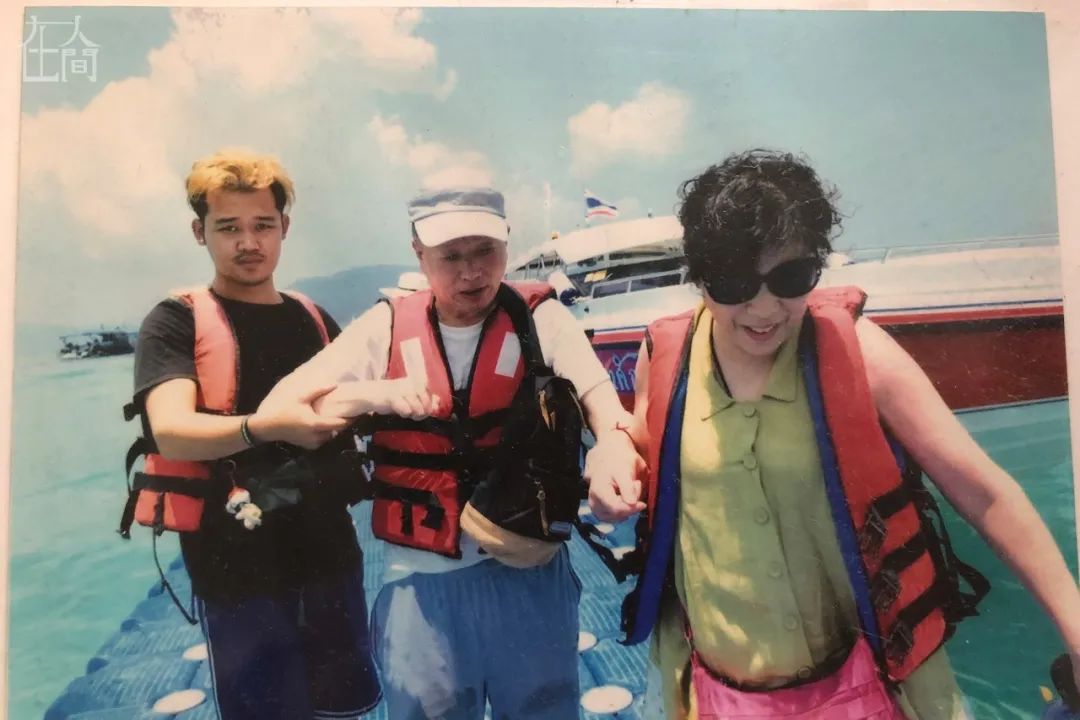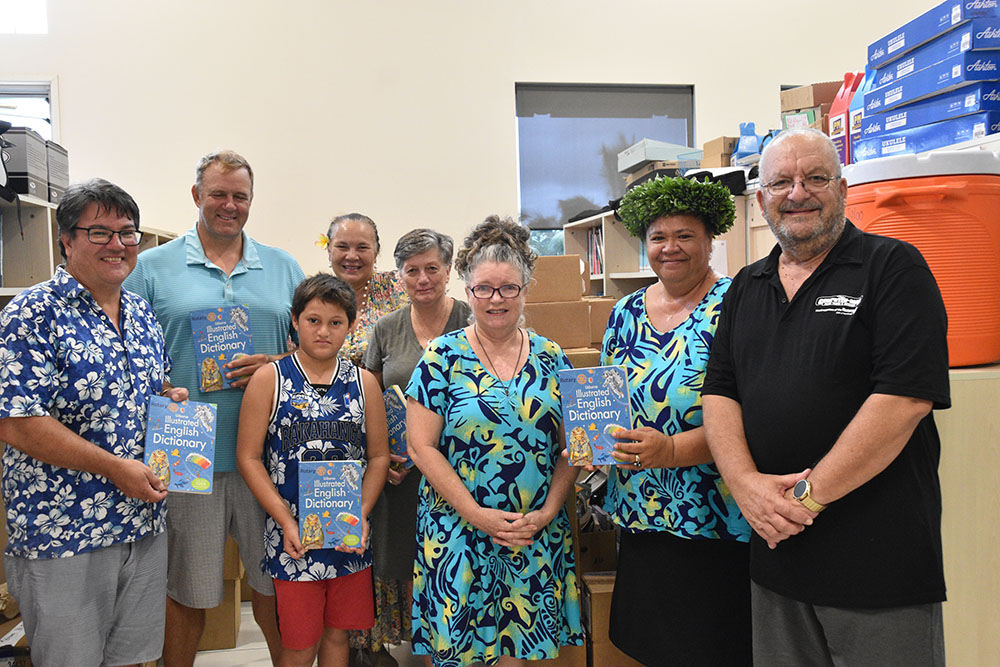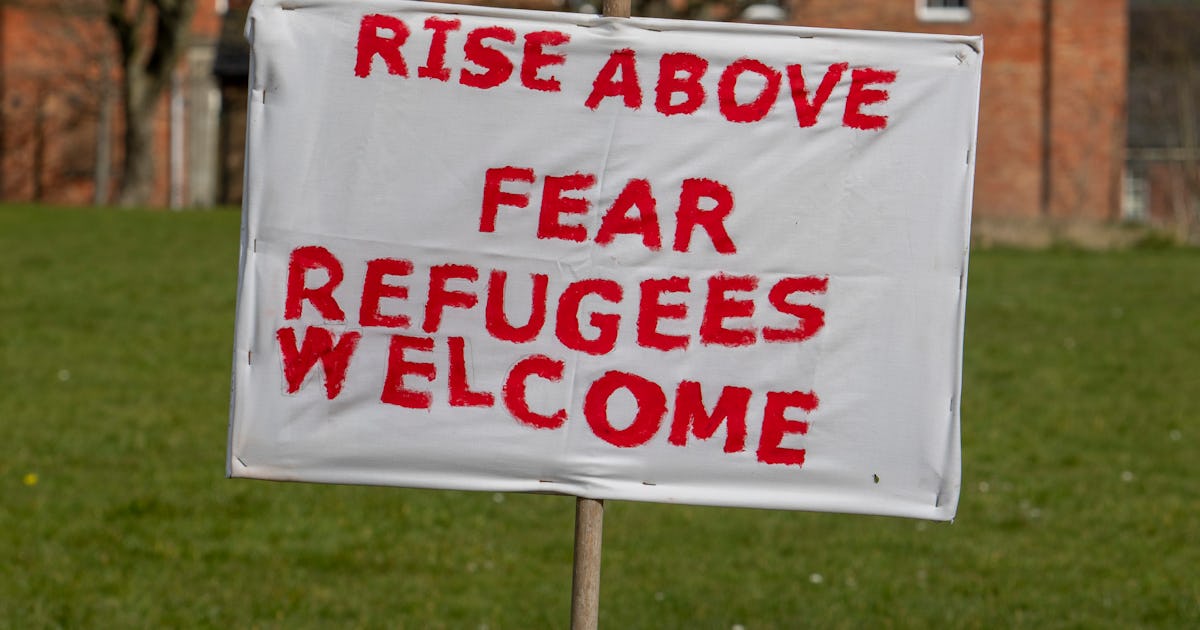This spring, while nationalist fervor to “support Xinjiang cotton” swelled online, voices in China calling to “support Xinjiang people“—fellow Chinese citizens targeted by China’s “anti-terrorism” campaign in the region—were often silenced. The boycott of H&M and other foreign clothing brands pledging not to source cotton from Xinjiang has largely stayed online, but recalls earlier nationalist protests that took violence to the streets. On April 6, Phoenix TV’s “Living” (在人间) public WeChat account published Luo Lan’s story of the ruin brought on two families—a victim’s, and his attacker’s—by the 2012 anti-Japanese protests, when rioters targeted Japanese cars and their drivers. CDT’s translation of the article follows:
Nine Years after Anti-Japanese Protests, Two Families Forever Shattered by One Act of Violence

Li Jianli and Wang Juling in Thailand in 2019.
The doctor holds Li Jianli’s right hand. Supporting Li’s elbow, the doctor lifts his right arm over the top of his head in a circle, once, then again.
After finishing with his right arm, they switch to the right leg, then the left arm, then the left leg. Muscle tissue that can’t move on its own needs help to maintain basic resilience and strength.
This is the Xi’an City Center Hospital Rehabilitation Center, where Li comes for physical therapy (PT) once a day, every day. He has been living this life for nine years.
On September 15, 2012, during the immense anti-Japanese demonstrations in Xi’an, Li was attacked while driving his white Toyota. Cai Yang, a young laborer, struck Li in the head with a bicycle U-lock, cracking open his skull. About two weeks later, Cai was arrested in his hometown of Nanyang. He was sentenced to ten years in prison.
During the subsequent nine years, the two families have been shattered, each suffering in different ways. Li’s movement and language abilities have deteriorated. He and his wife stay in the hospital most of the time, only going home on weekends. Meanwhile, Cai’s parents have left their hometown to make their living as forest wardens, going months at a time without eating meat.
For others, time flows like water, but for these families, time is a turbid current thick with gravel and silt. Every step forward is slow and painful.
Today, the echoes of that break are faint, but they cannot be muted.
Li Jianli lies on the PT bed, white discs attached to electrodes covering his right arm. This is electromagnetic therapy, the first item of the day.
The rehabilitation center is on the fifth floor of the outpatient department. When his wife, Wang Juling, walks in with Li, the doctors, nurses, and cleaning staff all greet them. “We’ve been here a long time,” Wang says. “They all know us.”
The couple moved in here after Li’s injury. Every day, they come from the inpatient department in the rear court to the rehab center for treatment. They’ve been doing this for almost nine years. Ten days ago, the hospital informed them that the ward is going to be renovated, and will not be able to accommodate them for the time being. Now Wang must take Li home at night and come back every morning.
Li is 60 years old. His gray hair is sparse, and he always wears a hat when he goes out to cover the six-inch scar on his head. Hair does not grow on the scar, nor can it be touched when bathing. There is a subtle trace of incongruity in his face, probably because of his left-brain injury. When he’s not speaking or laughing, his expression looks a bit dull.
When he walks, Li is used to taking his first stride with his right leg. After the injury, the right side of his body became hemiplegic, and he could barely walk. It would be safer for him to start with his left leg, but his wife says that “he always feels scared and uses that (right leg) first.” He is OK on flat ground, but when he comes upon a slight slope in the road, he is prone to trip and fall.
Except from his wife, Li declines all offers of physical support, striving to maintain his dignity. He used to love to talk and laugh, and he still retains a trace of good humor despite years of illness. Now he smiles and looks at the doctor massaging him. The young man, embarrassed, smiles and says, “Don’t look at me like that.” Li turns his head to the female doctor, who has been treating him for a long time. “She’s closer with me than my daughter!”
Wang can’t help but smile. “You have a daughter now, do you?” The couple has two sons, but no daughters.
Li’s speech is still fairly clear, but he is limited to short, simple sentences. Wang says that the blow from that fateful year injured the language center of his brain. Li could not speak at all when he first came out of surgery. The doctors made him read newspapers, speak, and make conversation, getting through it all word by word. “Now he can speak like this, but he’ll still trip up in the middle”; “Sometimes when he’s talking to you, he’ll go um um um um. The more rushed he gets, the less he is able to speak.”
After the right half of his body is massaged, Li turns himself over to the other side of the bed for the massage on his left side. “You can see he moves well (on the bed), he moves very freely,” Wang says, “but at home it’s very difficult for him to get out of bed.”
Maintaining his current physical condition is the result of years of persistent treatment. Wang remembers that shortly after the accident, she took her husband to West China Hospital in Chengdu, where the doctor said, “It’s already a win if you can maintain your current condition. As you get older, you will develop convulsions, epilepsy, and urinary and fecal incontinence.”
Thanks to systematic treatment, PT, and exercise, Li’s physical condition has been fairly good over the past few years. There is no serious deformation or atrophy on the right side of his body, nor severe imbalance in his gait.
But the doctor’s prognosis is gradually starting to come true. “He’s already had a few seizures,” says Wang. A few days ago [during the Qingming festival], their son drove Li and his wife to the city outskirts for tomb sweeping, a stroll on the green, and a family meal. Li was happy. He had two bottles of a [non-alcoholic] drink. Then he became incontinent and defecated on himself. Wang is worried that such incidents will become more frequent. Now, if her husband doesn’t have a bowel movement before they leave for the day, she carries toilet paper and plastic bags to rehab.
The atmosphere of long-term hospital residence is not always as welcoming as the rehabilitation center. Wang says that in the beginning they stayed in a single room, and she could rest on the other bed. Later, the hospital said there were too many patients, and another person was placed in the room. She had to buy a simple folding bed. Later, more patients were added to the ward, and their room became a triple. There was often no room for her folding bed, so Wang had to squeeze into bed with her husband.
Whenever the weather changes, the right side of Li’s body becomes sore. Because he moves so little, his right armpit often gets inflamed and infected. Recently, the hospital stopped his medicated ointment. Wang went to the hospital. “They all said, ‘Don’t worry, we’ll contact you.’ I still haven’t heard back from them.”
She thinks “(the hospital) just wants us to leave.”
“We owe the hospital 1,580,000,” says Li from his bed.
Wang says that some time ago, the Central Hospital took them to court for being in arrears. After getting the mediation call, she went to the Political and Legal Affairs Commission about it. The matter was left unresolved.
Wang hopes that, in addition to shouldering the medical expenses, the guilty party will compensate “enough for him (Li) to live on”; “In a few years I’ll have to hire someone to nurse him. I can’t do it anymore. I just don’t have the strength”; “For someone in his condition, people won’t come for a daily (nursing fee) less than 150 to 170. And between our daily expenses and daily medical treatments, we need more. You do the math.” The 520,000 yuan he was compensated the year of the attack is stretched ever thinner as Li lives on.
When Li finishes PT, he sits up from the bed. Everyone in the room watches as he slowly extends his feet and puts on his shoes. “I wear Nike, Nike brand, made in China.” After a pause, he adds: “Rational patriotism!”
It’s eight or nine bus stops from the Central Hospital back to Li’s house, and they have to transfer.
Getting on the bus is difficult for Li. The door is narrow, and his wife can’t help him. He can only grab the railing with his left hand and struggle upward. Wang usually gets on first. After watching her husband board the bus, she grabs a seat and waits for her husband to sit down before she goes to swipe her card.
Getting over curbs is also a challenge. Accidents can happen if they’re not careful. A few days ago, the couple got off the bus near their home. Because there were guests coming that day, Wang rushed to buy vegetables and told Li to walk home. She’d just bought the vegetables when she received a call from her husband. He had fallen. “I was so scared that I tossed the food aside and rushed over to him. There were three people standing around him, two women and a man. I asked him, Why didn’t you ask these people for help? He said they wouldn’t.” Li remembers that he asked for help from the two women. The younger one wanted to help, but the older one stopped her. “She said we can’t help him, call 120 [the emergency number for ambulances].”
Wang couldn’t support her husband alone, so she asked the man to help, and together they lifted Li back up. Before, when Li fell at home, Wang had to drag him over to the dresser and lean him against it, then wrap her arms around him and finally lift him up.
After he fell outside, Wang never let him walk alone again. When it rains, they have to stay home, missing the day’s therapy session.
Passing a beautiful blue car on the road, Wang asks her husband, “How much do you think?”
Li takes a look. “200,000 yuan.”
Wang clicks her tongue. “So expensive. I’m thinking closer to 100,000 yuan. Then we could buy one.”
Both Li and his wife drove taxis when they were young. Wang still has a photo from when she was a driver in the 1990s: Sitting in the driver’s seat of a “Starlight Fleet” taxi, she is young, with a neat, short haircut, a beautiful face, and shining eyes. “I had a very high occupancy back then,” she recalls, her tired face brightening.
Later, the couple started a second-hand car business, and bought a car and a home. Their son was preparing to get married. On the day of the attack, they were driving their son and daughter-in-law to look at decor for their new house.
Later, Li gave the white Toyota to his son. The two people who had been driving the car for half a lifetime didn’t even want to touch it.
Their home is on the sixth floor. When he reaches the door, Li extends his left hand to verify his fingerprint. The home fingerprint lock was installed for his convenience. The fingers of his right hand are curled tightly together, unable to extend.
An old crimson sofa and wall clock furnish the dimly-lit living room. Boxes of PT equipment are stacked in a corner. A little tent stands by the window, waiting for their grandson and granddaughter to play in.
In an interview a few years ago, Wang said, “The only thing that makes me happy is being able to see my grandchildren every week.” Li feels the same way. But recently his grandchildren have come of age for extracurricular tutoring on the weekends, and so he rarely sees them.
Back at home, Li seldom speaks. Even if his wife reminds him to chat with visitors, he is reticent, focusing on his phone. “He watches PT videos on Douyin” and does whatever he can do, Wang says. He also likes to earn points online and exchange them for gifts. “It’s small things, shampoo, laundry detergent, toilet paper, boxes and boxes for you to buy.” It is the only housework he can take off his wife’s shoulders.
After years of hard work, Wang has heart disease and high blood pressure, and she is beginning to show signs of depression. Local journalist Jiang Xue is always in touch with the old couple. Some time ago, she called Wang to chat and found she “sounded more impatient than before.” Wang went to see the doctor. “The doctor asked if I was feeling irritable. I said yes, I’m so wound up I want to kill someone. I can’t help it. If something goes wrong, it just sets me off.”
When Wang gets home, her mood gradually improves, and she takes out old photos and shows them to her visitors. Before the accident, the couple liked to travel. They had been to Hong Kong, Macau, Guilin, Chengdu, and Hainan. They had planned to go abroad, but after the injury, the only place they went to was the hospital. “This is gone today, that doesn’t work tomorrow. How can I be in a good mood?”
In 2019, the couple joined Wang’s colleagues on a trip to Thailand, fulfilling Li’s dream of going abroad and giving Wang an opportunity to relax.
To this day, Wang’s spirit soars when she recalls the trip. She says that the two tour guides were especially good and took care of Li every step of the way. “We were about to board a cruise ship, but the crew stopped us, saying he (Li) couldn’t get on this way. The tour guides explained that I was responsible if something went wrong. They asked the four crew members to carry him (onboard). ”
One day as they were walking on the beach, Li Jianli was unsteady and turned his right foot out badly. “I asked if he wanted to rest a while. He said it was OK, and he gritted his teeth and walked on. He was so happy when we got back.”
Wang posted the travel photos and videos to her WeChat Moments. “A lot of people ‘liked’ it and encouraged me to keep up the fight.” She “felt very moved,” but also “found it difficult to bear.”
This rare luxury should be a part of their daily life.
Yang Shuilan doesn’t know exactly where she is, just that she is in Xi County, Xinyang City in Henan Province, almost 300 kilometers from her hometown.
A few years after her son, Cai Yang, was taken away by the police, Yang and her husband Cai Zuolin left their hometown of Zhang Village, Nanyang City, and went to Xichuan, 120 kilometers away, to make a living as forest wardens. Later, they moved to where they are now, still doing the same work.
Yang is 66 years old, and Cai is 71. “His health gets worse every day,” Yang says. Cai once injured his legs, and the hyperplasia in his right knee has gotten worse as he’s aged. Now he’s often in pain and limps when he walks. He has the new rural cooperative medical insurance, but it is troublesome to use in a new place, and he is “afraid of spending money,” so he goes to a small pharmacy to buy over-the-counter medicine.
But he must go on. In addition to looking after the trees, they also have to grow corn and vegetables on the edge of the woods for the better part of their grain ration. If it is not enough, they must walk half an hour to the nearest store. As for meat, they only get what their children bring them when they visit.
Yang has had heart problems over the past few years. She simply takes medicine when she feels unwell. Her daughter buys most of the medicine online, because “it’s cheaper online.” Her doctor tells her to avoid getting upset, but she can’t help it. “There are so many things that make me angry, family matters. I’m just angry, and I can’t say (why).”
They live in a tile-roofed house left by the previous forest wardens. It leaks when it rains, and they live “in fear of one big storm.” Cai and Yang have nailed a tarp under the ceiling to hold the water, but they’re still worried. “We’re afraid the house will collapse.” They told their boss they wanted some repairs done, “but it was all in vain.” If a heavy rain comes, they have arranged to stay with a family nearby for two days. “We’ve been here a long time,” Yang say. “We all know each other, and there are good people.”
The couple agreed to a salary of about 1,000 yuan per month, paid annually as a lump sum. This is their only source of income. So far, though, they have only been paid for their first year of work. “If we don’t sell any trees, we don’t get (paid).” But the two of them choose to stay here. “We’re old, we can’t do any other work.” “When the time comes, they will pay us. I don’t think they will deny what is ours.”
Cai Yang is still in prison. Nine years have passed since the disaster.
Its shadow still looms over the two families, and may never disperse. [Chinese]
Translation by Alicia.






